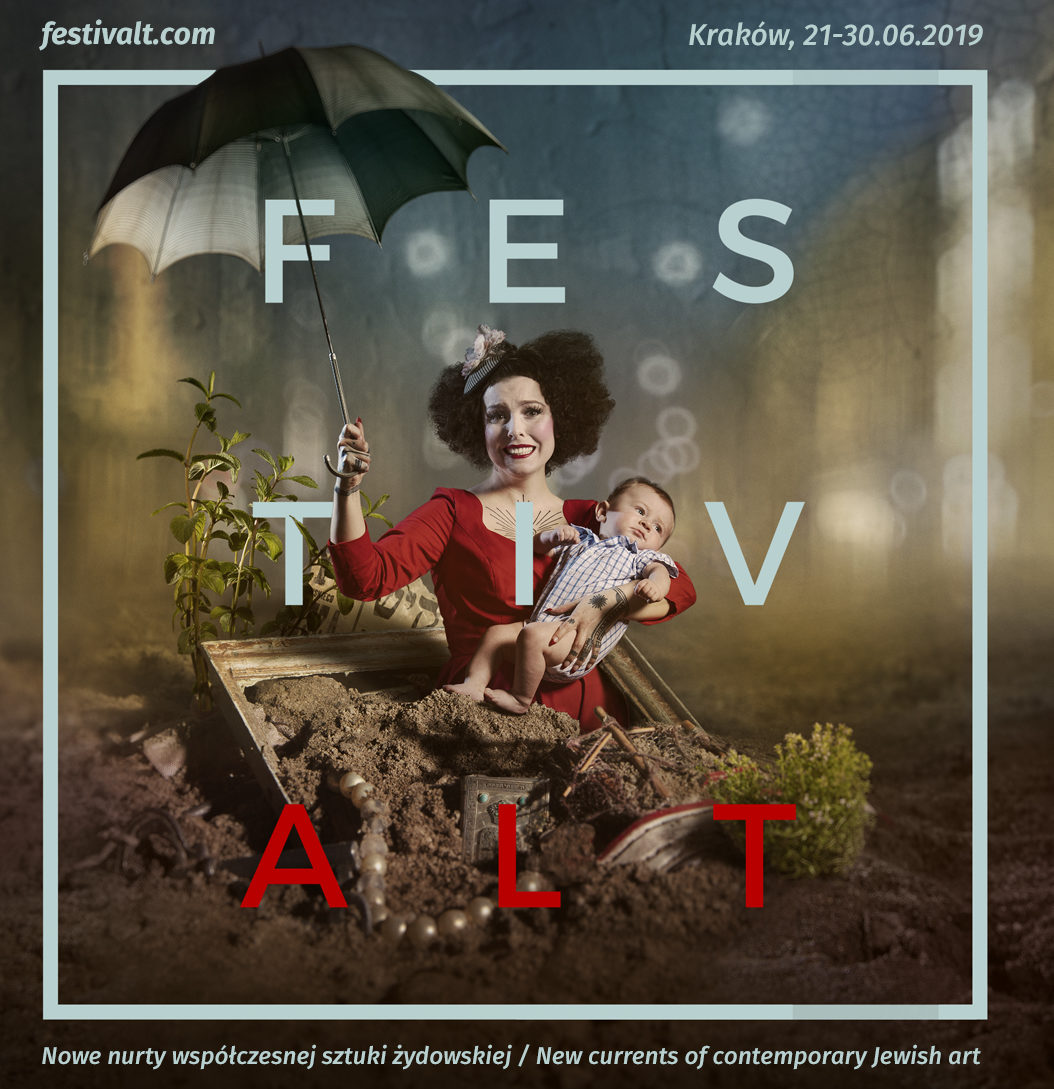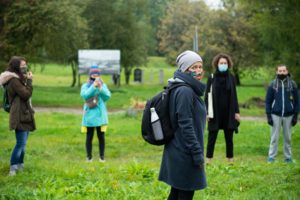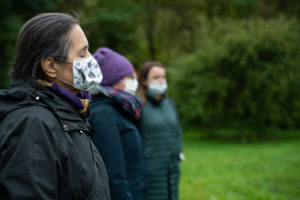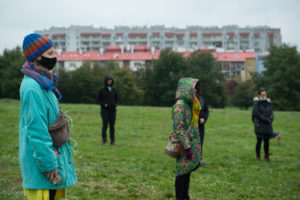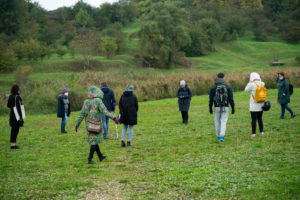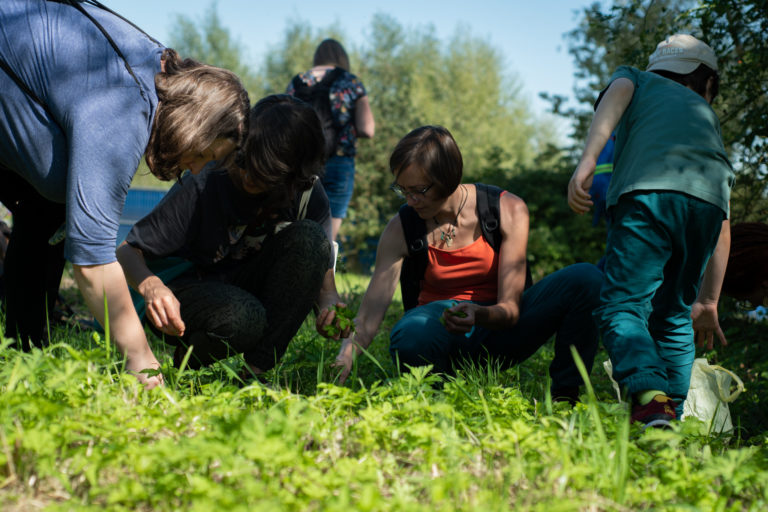
|
A cycle of walks showing multi-threaded and complex history and presence of Płaszów The site of the former concentration camp KL Płaszów, in the Podgórze district of Kraków, is caught between the past and the present. Once the site of an Austrian military encampment, it was later converted into two Jewish cemeteries, upon which the Nazis built a concentration camp; today it is primarily a public park and recreation area, with a scattering of monuments and markers of memory. Foreigners rarely visit it, and many locals know too little about what happened there. FestivALT has been engaging with the site’s use and misuse and the remembering and forgetting of its history for years. How does violent history become mundane? How can this largely ignored place re-enter public consciousness? What potential for healing does the site offer?
Walk: Płaszów: Green space or site of memory? Do we have to choose one? Several decades after the war, the site of the Płaszów concentration camp was turned into a green enclave, readily visited by locals. The conversation about how the site’s history should be remembered has gone on for years. Residents fear that the site will become heavily commercialized and flooded with tourists if it’s turned into a museum and memorial complex. The biggest concern, however, is that building a museum and parking lot would necessitate cutting down several hundred trees. How does the site function today? What are the benefits and risks with how the site is currently used? What are the site’s flora and fauna? What impact should local residents have on deciding how the land is used? Is it possible to reconcile the current and future needs of the local community with the tragic history of the site? In the era of climate and ecological disaster, can we afford to cut down more trees? We’ll address these questions and more during our next tour through the site of Płaszów, the second in our series of four ALT Tours through the site. This tour will be led by activists from Rescue Action for Kraków. Tour guides: Dr. Zofia Prokop – an evolutionary biologist who works at the Institute of Environmental Sciences at Jagiellonian University. Dr. Prokop is the Dean’s representative on the climate crisis. She is an activist and co-founder of Science for Nature and Rescue Action for Kraków. Maciej Fijak – a community activist, Krakovian, resident of Podgórze, and ambassador for local engagement. Maciej is involved in Rescue Action for Kraków. The walk will take place 17.10.2020 at 11:00 Meeting point: ul. Jerozolimska 3 (near Szary Dom/Gray House) Walk: Being present. A mindful walk through Płaszów The site of the former Płaszów concentration camp is a place with a multi-layered history. For several years, it was a place of extermination of Jews. At the same time, it’s one of the most beautiful and wildest green spaces in Krakow. Covered with lush, varied vegetation, it’s an enclave of peace and quiet in the middle of the stuffy city. During the walk we will focus on exploring the space by using our senses, feeling, and following what attracts attention. Contexts and meanings connected with the history of Płaszów may or may not appear in this process. Our attentive presence will be most important. During the meeting we will try to develop a personal relationship with the site, to understand at what level and in what way its complexity touches our own sensitivities.
The walk will be led by Zofia Noworól-Ostrowska, a Cracovian whose Jewish ancestors lived and died in Kazimierz and Podgórze. Classical yoga and meditation teacher, she leads movement practices using techniques of experimental choreography. The activities planned for the walk are simple practices of mindfulness, body awareness and working with space using the iLanding method developed by Jennifer Monson. The walk took place 11.10 at 11:00
Meeting point: ul. Jerozolimska 3 (near Szary Dom/Gray House) Walk: Medicinal Plants of Płaszów The site of KL Płaszów, in the Podgórze district of Kraków, is a former concentration camp site unlike most others: it exists today primarily as a public park and recreation area, with a smattering of monuments and markers of memory. The site’s use and misuse, the remembering and forgetting of its history, have preoccupied members of the FestivALT collective for years. Medicinal Plants of Płaszów is an experimental answer to the questions: “What forces of healing is the genocidal earth of Płaszów itself generating?” and “Is it possible to harness the power of that natural healing for social healing?” As it turns out, all manner of medicinal plants and herbs grow in the site. During last year’s edition of FestivALT, we worked with ethnobotanist Karol Szurdak and Miejski Ośrodek Pomocy Społecznej, a local social welfare centre, to create a garden of Płaszów’s medicinal plants.
Ethnobotanist Karol Szurdak will lead a walk around Płaszów pointing out various medicinal plants, followed by a workshop on infusions, teas, and lotions that we’ll make from plants and herbs gathered from the site of KL Płaszów. The walk and the workshop proposes a new relationship to the earth of the concentration camp, one that challenges participants to care for the land and questions what use of it might be possible (and which might go too far). Walk: Płaszów: memory Overwritten A tour of the former camp area prepared and performer by Adam Schorin, a descendant of the Survivor from KL Płaszów. Adam pointed out how successive chapters in the history of the area’s existence (Austrian fortifications, Jewish cemeteries, a concentration camp and, finally, the present green area) left their mark on the awareness of the place and topography of the area.
SPECIAL THANKS In cooperation with Allianz Kulturstiftung. The project was co-financed by the Dutch Jewish Humanitarian Fund and Asylum Arts. The Medicinal Plants of Płaszów project is co-financed by the Jewish Historical Institute Association Stowarzyszenie Żydowski Instytut Historyczny. The project is co-organised by the Nadaye Foundation. In cooperation with MOPS (City Social Service) Kraków SPECIAL THANKS In cooperation with Allianz Kulturstiftung. The project was co-financed by the Dutch Jewish Humanitarian Fund and Asylum Arts. The Medicinal Plants of Płaszów project is co-financed by the Jewish Historical Institute Association Stowarzyszenie Żydowski Instytut Historyczny. The project is co-organised by the Nadaye Foundation. In cooperation with MOPS (City Social Service) Kraków. |
